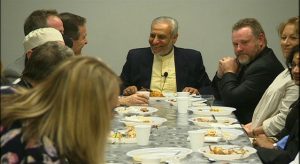SYDNEY – Australia’s Grand Mufti Dr. Ibrahim Abu Mohammed has invited members of various Christian denominations to an interfaith iftar, in an attempt to dispel ongoing misconceptions about Muslims.
“Our guests tonight will find a home, and a heart with much love for them,” Dr. Mohammed told SBS through an interpreter on Sunday, June 12.
“I don’t see them as ‘others’. We are one with the same missions.
“To me, an ‘other’ is someone who goes against the real traits of humanity, even if they’re Muslim.
“Someone who differs in culture or country, I consider them part of the same family, even if we do things differently.”
Ramadan is the holiest month in Islamic calendar.
In Ramadan, adult Muslims, save the sick and those traveling, abstain from food, drink, smoking and sex between dawn and sunset.
Muslims dedicate their time during the holy month to become closer to Allah through prayer, self-restraint and good deeds.
Around the globe, Muslims observe Ramadan with a set of traditional rituals including family gathering at iftar, religious lessons, special evening prayer and helping the poor, Muslims and non Muslims alike.
The Grand Mufti has been encouraging Islamic leaders and followers to open their doors to the wider community.
He promised to hold more multi-faith Iftars in the future, in the hope they will be bigger and more diverse than ever.
Muslims, who have been in Australia for more than 200 years, make up 1.7 percent of its 20-million population.
Islam is the country’s second largest religion after Christianity.
Welcome 
The invitation was welcomed by several Christian churches, including the Venerable Rod Bower, the Anglican Archdeacon of the New South Wales Central Coast.
“Interfaith dialogue and interfaith friendships are quite counter-intuitive,” he said.
“Birds of a feather tend to want to flock together. But I think Australian people as a whole are very gracious.
“Given the opportunity, like Iftar dinners, they soon see through that stereotyping.”
Another guest, Coptic Orthodox Priest Father Shenouda Mansour, noted that breaking bread is a much more effective way for people of different faiths to express and share ideas.
“If I want to build a relationship, I have it over a meal,” he said.
“Otherwise, formalities build walls rather than breaks walls; it’s (about) sitting down here, hearing each other’s stories, looking at the real human being rather than having a label.”
Anna Ektoros was invited to attend the dinner by a close friend, attending the first iftar in her life.
“I wasn’t sure what to expect,” she said. “What am I meant to do? What am I meant to wear? What do I say?
“I think it’s really great at making it less unknown to people like myself, who are just part of the community.”